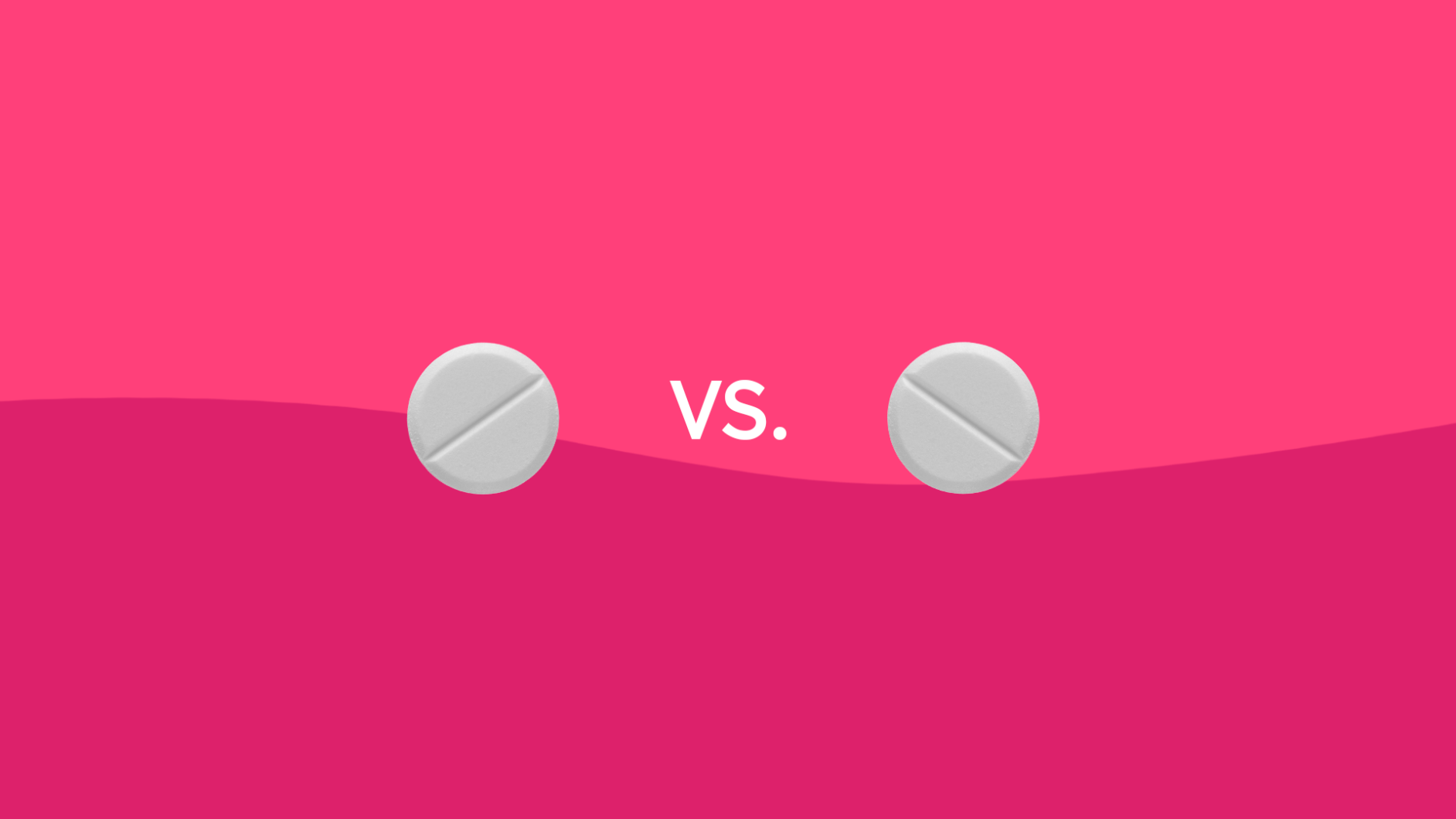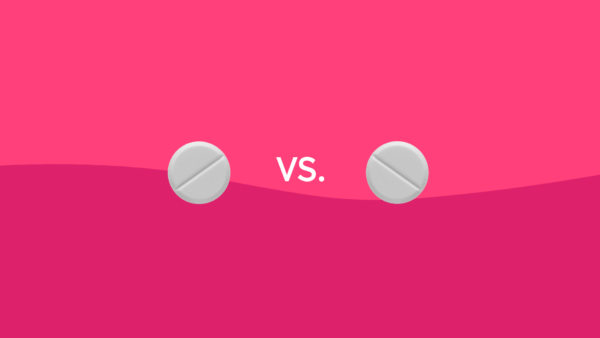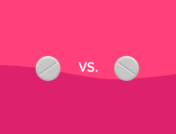Drug overview & main differences | Conditions treated | Efficacy | Insurance coverage and cost comparison | Side effects | Drug interactions | Warnings | FAQ
If you or your child have been diagnosed with ADHD, your healthcare provider may have mentioned trying ADHD medication as part of a comprehensive mental health treatment plan, including social, behavioral, and educational resources. ADHD is common: 6.4 million children age 4 to 17 in the U.S. have been diagnosed with ADHD, and 4% of adults have ADHD.
Concerta and Ritalin are two stimulant ADHD medications approved by the United States Food and Drug Administration (FDA). Both prescription drugs are indicated for ADHD (attention deficit hyperactivity disorder) treatment. Both medications contain the same ingredient, methylphenidate. Concerta contains a long-acting form of methylphenidate, while Ritalin contains an immediate-release form of methylphenidate. Concerta and Ritalin work by acting on the CNS (central nervous system) to increase levels of dopamine and norepinephrine in the brain, which helps improve ADHD symptoms such as concentration and alertness.
Both drugs are classified as Schedule II drugs by the Drug Enforcement Administration (DEA), meaning that there is a high potential for drug abuse and dependence.
Although Concerta and Ritalin are both stimulants that contain methylphenidate, they have some differences. Continue reading below to learn more about Concerta and Ritalin.
What are the main differences between Concerta and Ritalin?
Concerta and Ritalin are both classified as stimulant medications and both are available in brand-name and generic form. The generic name of Concerta is methylphenidate (extended-release). Concerta is designed to last for about 12 hours, and it is dosed once per day.
The generic name of Ritalin is methylphenidate and is an immediate-release tablet. One dose of Ritalin lasts about four hours, so it is dosed more often, usually two to three times per day.
Other forms of Ritalin are longer-acting. Ritalin-LA is a long-acting capsule (available in brand and generic) and Ritalin-SR (available in generic) is a long-acting tablet. Ritalin LA has a bi-modal release. Half of the methylphenidate is released immediately, and the second half is released later. A dose of Ritalin LA lasts for about eight to 10 hours. A dose of Ritalin-SR lasts for about eight hours.
The length of treatment with Concerta or Ritalin varies. Some patients take a “drug holiday,” where the medication is temporarily stopped, for example, during summer vacation when school is not in session. Your healthcare provider can help you decide if you or your child should take a drug holiday.
| Main differences between Concerta and Ritalin | ||
|---|---|---|
| Concerta | Ritalin | |
| Drug class | Stimulant | Stimulant |
| Brand/generic status | Brand and generic | Brand and generic |
| What is the generic name? | Methylphenidate hydrochloride extended-release | Methylphenidate hydrochloride |
| What form(s) does the drug come in? | Extended-release tablet | Tablet, extended-release capsule (Ritalin LA), extended-release tablet (Ritalin-SR) |
| What is the standard dosage? | 18, 36, 54, or 72 mg once daily in the morning (dosage depends on age, weight, and response to treatment) | Children: 5 mg twice daily to begin, dosage may be increased slowlyAdults: Average daily dose is 20 to 30 mg in divided doses 2 to 3 times daily (example: 10 mg given 3 times daily equals total daily dose of 30 mg) |
| How long is the typical treatment? | Varies: may be needed for extended periods but has not been studied for more than 7 weeks; consult healthcare provider | Varies: may be needed for extended periods; consult healthcare provider |
| Who typically uses the medication? | Ages 6 to 65 | Ages 6 years to adult |
Want the best price on Ritalin?
Sign up for Ritalin price alerts and find out when the price changes!
Conditions treated by Concerta and Ritalin
Concerta and Ritalin are both indicated for ADHD treatment in children ages 6 years and older, adolescents, and adults. Ritalin is also indicated for narcolepsy. Concerta or Ritalin should be used as part of a comprehensive treatment plan that may include therapy and educational intervention.
| Condition | Concerta | Ritalin |
| Attention Deficit Hyperactivity Disorder (ADHD) in children 6 years and older, adolescents, and adults up to age 65 | Yes | Yes (Ritalin manufacturer information does not specify a maximum age) |
| Narcolepsy | Off-label | Yes |
Is Concerta or Ritalin more effective?
There are no studies that directly compare Concerta and immediate-release Ritalin. Clinical trials for Concerta studied patients who took either Concerta, Ritalin, or placebo; however, the results only compared Concerta to placebo and did not include Ritalin. The results showed that Concerta was superior to placebo, but did not show results in relation to Ritalin.
When comparing Concerta against Ritalin, remember that both drugs contain methylphenidate, so we are looking at the same drug. The difference lies in the way the drugs are dosed and how long they last. Concerta lasts about 12 hours and is dosed once daily in the morning, so it may be a better choice for someone who has to focus for many hours and does not want to have to take additional doses of medication. Ritalin, which works for about four hours, may be a better option for someone who just needs a few hours of medication coverage or someone who does not mind taking additional doses when needed.
The most effective drug for you should be determined by your healthcare provider who can take into account your medical condition as well as your medical history and other medications you take that can interact with Concerta or Ritalin. Consult your prescriber for medical advice.
Want the best price on Concerta?
Sign up for Concerta price alerts and find out when the price changes!
Coverage and cost comparison of Concerta vs. Ritalin
Concerta is not typically covered by Medicare Part D. It may be covered by insurance, typically in its generic form. The out-of-pocket cost for 30 Concerta 36 mg generic tablets can be more than $300. A SingleCare coupon can reduce this cost to well under $150.
Ritalin is generally covered by Medicare Part D and may be covered by insurance, usually in the generic form. The out-of-pocket cost of 60 Ritalin 10 mg generic tablets is about $85. This cost can be reduced to less than $25 with a SingleCare coupon at participating pharmacies.
Get the SingleCare prescription discount card
| Concerta | Ritalin | |
| Typically covered by insurance? | Varies | Varies |
| Typically covered by Medicare? | No | Yes |
| Standard dosage | 30, 36 mg tablets | 60, 10 mg tablets |
| Typical Medicare copay | $230 | $3-$48 |
| SingleCare cost | $130-$180 | $23-$53 |
Common side effects of Concerta vs. Ritalin
The most common side effects of Concerta are abdominal pain, decreased appetite, weight loss, headache, dry mouth, nausea, insomnia/sleep problems, anxiety, dizziness, irritability, and hyperhidrosis (increased sweating). Ritalin has similar side effects, but the frequency percentages are not listed. This is not a full list of side effects. Serious side effects may occur. Consult your healthcare provider for a full list of adverse effects that can occur with Concerta or Ritalin.
| Concerta | Ritalin | |||
| Side effect | Applicable? | Frequency | Applicable? | Frequency |
| Upper abdominal pain | Yes | 6.2% | Yes | Not reported* |
| Decreased appetite/weight loss | Yes | ≥5% | Yes | Not reported |
| Headache | Yes | ≥5% | Yes | Not reported |
| Dry mouth | Yes | ≥5% | Yes | Not reported |
| Nausea | Yes | ≥5% | Yes | Not reported |
| Irritability | Yes | ≥5% | Yes | Not reported |
| Anxiety | Yes | ≥5% | Yes | Not reported |
| Excess sweating | Yes | ≥5% | Yes | Not reported |
| Vomiting | Yes | 2.8% | Yes | Not reported |
| Fever | Yes | 2.2% | Yes | Not reported |
| Upper respiratory infection | Yes | 2.8% | Yes | Not reported |
| Dizziness | Yes | 1.9% | Yes | Not reported |
| Insomnia | Yes | 2.8% | Yes | Not reported |
| Cough | Yes | 1.9% | Yes | Not reported |
*Percentages not reported with Ritalin
Source: DailyMed (Concerta), DailyMed (Ritalin)
Drug interactions of Concerta vs. Ritalin
Concerta or Ritalin should not be taken with MAOIs (monoamine oxidase inhibitors) because the combination could cause a hypertensive (high blood pressure) crisis. Concerta or Ritalin should be separated by an MAOI by at least 14 days. Concerta or Ritalin should be used with caution with vasopressor agents (medications that are used to increase blood pressure) because of the potential for an increase in blood pressure. Concerta or Ritalin may increase the levels of warfarin, certain anticonvulsants, and tricyclic or SSRI antidepressants. A dosage adjustment may be required if taken with Concerta or Ritalin. Concerta or Ritalin may decrease the effectiveness of diuretics or blood pressure medications. This is not a full list of drug interactions. Consult your healthcare provider for a full list of drug interactions.
| Drug | Drug Class | Concerta | Ritalin |
| Phenelzine Rasagiline Selegiline Tranylcypromine |
MAOI | Yes | Yes |
| Dobutamine Epinephrine Norepinephrine Phenylephrine |
Vasopressor agents | Yes | Yes |
| Warfarin | Anticoagulant | Yes | Yes |
| Citalopram Escitalopram Fluoxetine Fluvoxamine Paroxetine Sertraline |
SSRI antidepressants | Yes | Yes |
| Amitriptyline Desipramine Imipramine Nortriptyline |
Tricyclic antidepressants | Yes | Yes |
| Phenobarbital Phenytoin Primidone |
Anticonvulsants | Yes | Yes |
| Furosemide Hydrochlorothiazide |
Diuretics | Yes | Yes |
| Amlodipine Atenolol Diltiazem Enalapril Irbesartan Lisinopril Losartan Metoprolol Olmesartan |
Antihypertensives | Yes | Yes |
Warnings of Concerta and Ritalin
You will receive a medication guide every time you fill a prescription for Concerta or Ritalin, which contains warnings and information about side effects. Concerta and Ritalin both have a boxed warning, which is the strongest warning required by the FDA. Because of the risk of abuse or dependence, patients should be assessed for the risk of abuse before being prescribed Concerta or Ritalin. Patients who take Concerta or Ritalin should be monitored for signs of abuse during treatment.
Other warnings:
- Sudden death has been reported with stimulant medications, even at normal doses. This has happened in children/adolescents with certain heart abnormalities or problems. Sudden death, stroke, and heart attack have been reported in adults. These events are more likely to occur in adults with heart abnormalities or other heart problems. Therefore, stimulants such as Concerta or Ritalin should not be used in children, adolescents, or adults with heart problems or abnormalities.
- Blood pressure and/or heart rate may increase; patients should be monitored. Patients with blood pressure or heart problems should be treated with caution.
- Hypersensitivity is rare but may occur. If you have trouble breathing, or swelling of the face, throat, tongue, or neck, stop taking Concerta or Ritalin and seek emergency medical treatment.
- Stimulants may exacerbate symptoms of behavior disturbance and thought disorder in patients who have a preexisting psychotic disorder, such as bipolar disorder. Patients should be screened before beginning a stimulant.
- Patients starting ADHD treatment should be monitored for the appearance or worsening of aggressive behavior or hostility.
- Stimulants may lower the seizure threshold in patients with a prior history of seizures. If seizures occur, the drug should be discontinued.
- Priapism (prolonged, painful erection) has occurred. If this occurs, seek immediate medical attention.
- Patients on Concerta or Ritalin should be observed for peripheral vasculopathy, including Raynaud’s phenomenon.
- Children’s growth should be monitored during stimulant treatment. Children who are medicated seven days a week all year long may have a temporary slowing in growth rate.
- Blurred vision may occur. Consult your healthcare provider if this occurs.
- CBC, differential, and platelet counts should be periodically monitored.
- Because of the shape of the Concerta tablet, patients with certain GI (gastrointestinal) problems should not take Concerta. This is because the tablet does not change shape in the GI tract and could cause obstruction.
- The Concerta tablet should be swallowed whole and should not be chewed, split, or crushed. The (inactive) shell of the tablet may appear in the stool.
- Ritalin-SR tablets should be swallowed whole and may not be crushed or chewed.
- Ritalin LA capsules should be swallowed whole, and should not be crushed, chewed, or divided. Or, you may open a Ritalin LA capsule and sprinkle the beads over one spoonful of applesauce and consume immediately. Do not store the mixture for future use.
Frequently asked questions about Concerta vs. Ritalin
What is Concerta?
Concerta is a stimulant that is used to treat ADHD. It contains a long-acting form of methylphenidate and is taken once a day.
What is Ritalin?
Ritalin is a stimulant that contains methylphenidate and is used to treat ADHD or narcolepsy. It is generally taken two or three times daily because it is short-acting. Longer-acting forms of Ritalin are available, too.
Are Concerta and Ritalin the same?
Concerta and Ritalin both contain the same active ingredient, methylphenidate. However, Concerta is designed to last for about 12 hours, so it is dosed once per day in the morning. Ritalin, in its immediate-release form, is dosed two or three times daily because it is shorter-acting.
Some examples of similar stimulant medications you may have heard of include Vyvanse, Quillivant XR, and Adderall (amphetamine salts), among others.
Is Concerta or Ritalin better?
There are no studies directly comparing Concerta and Ritalin. Because both drugs contain methylphenidate, the choice of which drug to use would depend on a number of factors, such as which drug is more appropriate for your schedule, which drug will be more convenient for your lifestyle, and your response to treatment. Your healthcare provider can help you decide if Concerta or Ritalin is an appropriate drug for you.
Can I use Concerta or Ritalin while pregnant?
Concerta and Ritalin are category C in pregnancy, meaning that there are no studies of the drugs in human pregnancy, but that animal studies have shown that there is danger to the fetus. Generally, Concerta or Ritalin are not used in pregnancy. If you take Concerta or Ritalin and find out that you are pregnant, contact your prescriber immediately.
Can I use Concerta or Ritalin with alcohol?
If you take a stimulant like Concerta or Ritalin, you should avoid alcohol. While stimulants are uppers, alcohol is a downer. They work against each other, and you may feel less intoxicated, causing you to drink more, which could lead to accidents or alcohol poisoning (which can cause irregular heartbeat, difficulty breathing, nausea, vomiting, and/or seizures).
Is Ritalin a speed?
Speed is methamphetamine. Adderall, another ADHD drug, contains amphetamine salts (amphetamine and dextroamphetamine), which are chemically related to methamphetamine. Speed, or methamphetamine, is more addictive than Adderall. It is also more toxic and can cause brain damage, heart damage, tooth decay, and other problems. Not to mention, methamphetamine is usually obtained on the “street,” which is riskier.
Ritalin contains methylphenidate. Like Adderall, Ritalin is a stimulant and is chemically similar to amphetamines. As a Schedule II drug, Ritalin has a high potential for abuse and dependence. If you or your child take Ritalin (or any ADHD medication), you should be closely monitored by your prescriber.
How will Concerta make me feel?
Concerta should help improve symptoms of ADHD. It may take some dosage adjustment until your healthcare provider finds the right dose for you. Some common side effects of Concerta are abdominal pain, decrease in appetite, weight loss, headache, dry mouth, nausea, sleep problems, anxiety, dizziness, irritability, and increased sweating. If you have any side effects that are serious or troublesome (such as rash or trouble breathing), notify your healthcare provider immediately.
Does Concerta change your personality?
ADHD medication should not change your (or your child’s) personality. Any unusual changes in personality could be a result of taking too high of a dose. If you notice personality changes, contact your prescriber about lowering the dosage or changing the medication.





